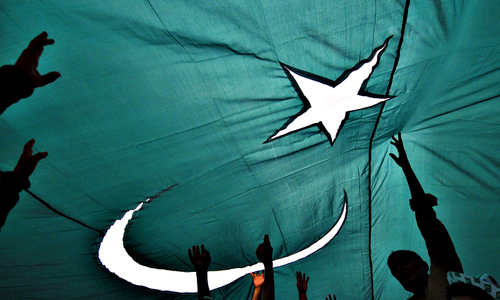ROME: Pakistanis are happier than Indians once again, according to findings of a United Nations-sanctioned report released on Wednesday.
Out of a total 157 countries that were evaluated, Pakistan came in at 92, while India was placed at 118. Both countries have slipped as last year's rankings had Pakistan at 81 and India at 117.
Aiming to "survey the scientific underpinnings of measuring and understanding subjective well-being," the report, now in its fourth edition, ranks countries by happiness levels using factors such as:
Read: I can see Pakistan rise once more.
GDP per capita, healthy years of life expectancy, social support (as measured by having someone to count on in times of trouble), trust (as measured by a perceived absence of corruption in government and business), perceived freedom to make life decisions, and generosity (as measured by recent donations).
Differences in social support, incomes and healthy life expectancy are the three most important factors.
Also read: Pakistan now among 95 countries to have met sanitation MDG: UN report
This time around, Denmark overtook Switzerland as the world's happiest place.
The report, prepared by the Sustainable Development Solutions Network (SDSN) and the Earth Institute at Columbia University, urged nations regardless of wealth to tackle inequality and protect the environment.
It showed Syria, Afghanistan and eight sub-Saharan countries as the 10 least happy places on earth to live.
The top 10 this year were Denmark, Switzerland, Iceland, Norway, Finland, Canada, Netherlands, New Zealand, Australia, and Sweden. Denmark was in third place last year, behind Switzerland and Iceland.
The bottom 10 were Madagascar, Tanzania, Liberia, Guinea, Rwanda, Benin, Afghanistan, Togo, Syria and Burundi.
The United States came in at 13, the United Kingdom at 23, France at 32, and Italy at 50.
"There is a very strong message for my country, the United States, which is very rich, has gotten a lot richer over the last 50 years, but has gotten no happier," said Professor Jeffrey Sachs, head of the SDSN and special advisor to U.N. Secretary General Ban Ki-moon.
While the differences between countries where people are happy and those where they are not could be scientifically measured, "we can understand why and do something about it," Sachs, one of the report's authors, told Reuters in an interview in Rome.
"The message for the United States is clear. For a society that just chases money, we are chasing the wrong things. Our social fabric is deteriorating, social trust is deteriorating, faith in government is deteriorating," he said.
"When countries single-mindedly pursue individual objectives, such as economic development to the neglect of social and environmental objectives, the results can be highly adverse for human wellbeing, even dangerous for survival," it said.
"Many countries in recent years have achieved economic growth at the cost of sharply rising inequality, entrenched social exclusion, and grave damage to the natural environment.”
Yardstick for happiness
The first report was issued in 2012 to support a United Nations meeting on happiness and well-being. Five countries ─ Bhutan, Ecuador, Scotland, United Arab Emirates and Venezuela ─ now have appointed Ministers of Happiness charged with promoting it as a goal of public policy.
The 2016 survey showed that three countries in particular, Ireland, Iceland and Japan, were able to maintain their happiness levels despite external shocks such as the post-2007 economic crisis and the 2011 earthquake because of social support and solidarity.
Sachs pointed to Costa Rica, which came in 14th and ahead of many wealthier countries, as an example of a healthy, happy society although it is not an economic powerhouse.
The full report can be accessed here.














































